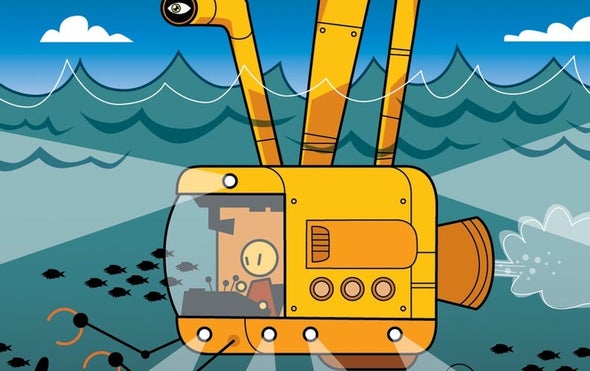Schoolbooks typically present explorers as intrepid individuals who, at the behest of colonizing leaders, sail wooden ships to new lands, ride on horseback across uncharted mountains or slash their way through the jungle. But today most explorers who are making fundamental discoveries are scientists. And whether the frontiers are minuscule, like the human genome, or massive, like our deepest oceans, we still have much left to learn about planet Earth. The quests that modern scientists pursue rival anything in a history book or an adventure novel.
Exploration is science in its most basic form—asking questions of the natural world and, we hope, using the answers for the betterment of everything on Earth.
Some unknown territories are emergent: human consciousness or why trillions of bacteria floating on the ocean suddenly glow in unison across more than 100 square miles. Frontiers can be cultural, too, and we must explore with respect.
Exploration has great value. It inspires us, widens our knowledge and gives us hope for a better future. And the practical payoffs can be plenty. Some are even lifesaving. Scientists who spent decades exploring what was in the atmosphere found that over time the concentration of carbon dioxide was rising. Without that discovery, we humans would now be living like the proverbial frog in a pot of gradually heating water, unsure why the environment around us is changing, and slowly boiling to death.
In the early 2000s Katalin Karikó and Drew Weissman of the University of Pennsylvania were studying fundamental molecules called messenger RNA (mRNA) in humans and realized that a few adjustments could prevent the molecules from causing inflammation. Then, in 2017, Weissman and Norbert Pardi, also at Penn, discovered how to modify mRNA to neutralize an invading virus. When COVID struck, Pfizer-BioNTech and Moderna rapidly created two powerful vaccines for the virus—using mRNA. Weissman says he and his co-explorers met several unexpected hurdles, but each one made them only more determined to convert their discoveries into something helpful.
The human drive to overcome challenges is an essential aspect of the human drive to explore. As Robert Ballard, who discovered the wreck of the RMS Titanic in 1985 and was part of the team that found the first deep-sea hydrothermal vents, told us recently: “The ocean is a formidable place. I was almost killed several times. But the human spirit is indestructible.” Ballard turned 80 in June and in May spent two weeks on an expedition in the Pacific Ocean.
That drive to take on challenges often spurs innovation. Technological advances have always helped the intrepid, and the inventions keep coming. Early human submersibles that reached the bottom of the deepest ocean trenches made the trip just once, stressed by the enormous pressures there. But eventually a more stress-resistant deep-submergence vehicle, the Limiting Factor, allowed investor and undersea explorer Victor Vescovo to reach trench bottoms numerous times.
Now there are roughly 4,000 autonomous Argo floats across the world's oceans that dive down to 2,000 feet and resurface every 10 days, gathering data about basic physical traits such as water temperature, salinity and pressure. Programmable vessels greatly expand our reach and reduce the risk to the people involved in exploration, allowing for the kind of discovery that the human body might limit. The Argo consortium will also deploy dozens of sensors every year that will gather biological and chemical data, leading to new observations about marine life.
Other institutions plan to deploy swarms of autonomous underwater vehicles that will search the seas in unison, sending data to guide ships that forward the information to researchers on shore, who then can redirect the swarms. Ocean research groups have made it a priority to openly share their discoveries and data with the public, to be more inclusive of people who live along waters being explored, and to inspire the next generation of young scientists. Anyone can go along for the ride—we can all be explorers.
Many commercial ventures are involved in exploration. Maybe one day you'll put on your virtual-reality goggles, connect with an online adventure company and rent a video-equipped remote vehicle that explores the Great Barrier Reef from above for several hours at your direction. Or the desert at the height of bloom. Or a rain-forest canopy.
Captain James T. Kirk began each episode of the original Star Trek television series by saying, “Space, the final frontier.” Not necessarily. We still have plenty to discover right here on Earth, and we eagerly await surprises from the newest worlds we find.
JOIN THE CONVERSATION ONLINE Visit Scientific American on Facebook and Twitter or send a letter to the editor: editors@sciam.com

